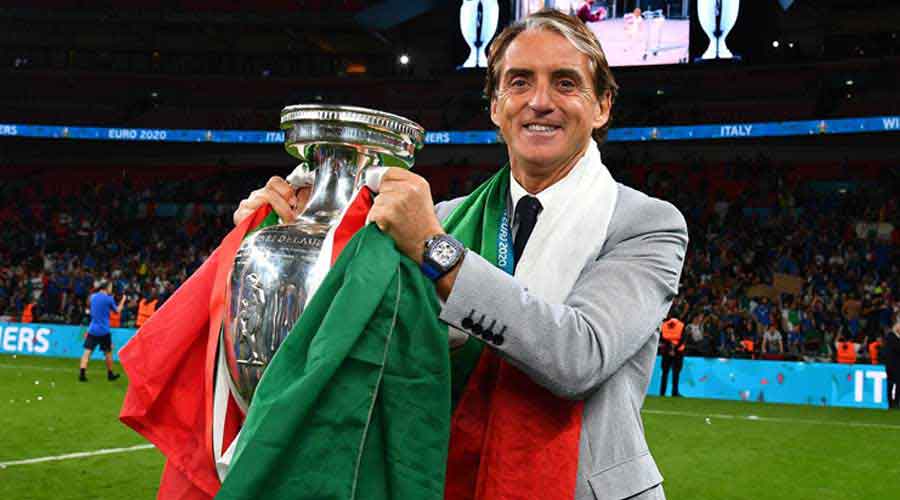Euro 2020 champions Italy have stayed unbeaten in 34 matches, just one short of the longest run (of 35) held jointly by Brazil (1993-96) and Spain (2007-09).
Since the defeat to Portugal in the Uefa Nations League back in September 2018, Roberto Mancini’s team has got most things right which culminated in the Azzurri’s second Euro title after 53 years on Sunday.
The football federation of Italy (FIGC), too, deserves credit for making players realise the need to enjoy being on the field, which helps to deal better with match situations.
“What we focused on right from the start was to have fun on the field, as that tends to make the job easier,” FIGC general secretary (youth and education department) Vito Di Gioia told The Telegraph from Rome.
“It is a strong message that has permeated through the entire federation right down to its youth activities.”
Mancini’s presence as head coach has certainly been pivotal to Italy’s success, which the FIGC has acknowledged. His contract was extended until June 2026 even before Euro 2020 began, and the “maestro” ensured he vindicated the federation’s faith in him.
“Mancini has been the architect of this new game philosophy and worked to create a team in which everyone is an important part, regardless of their age or experience. He has given a great opportunity to many young Italian players, showing that they deserve a chance and in return, they have presented their coach with solid performances.
“A team is held together by important values that go beyond the technical or tactical aspect and Mancini has been a maestro to inspire all of these,” Di Gioia emphasised.
“The coach has called up 76 players, including 32 newcomers, with 26.5 being the average age of this squad. According to our (FIGC) president Gabriele Gravina, extending Mancini’s contract implies investment for the future, one that we owe to the fans,” Di Gioia added.
Fighting Covid-19
Last year, Italy was one of the worst Covid-19 affected countries. But the FIGC’s medical commission was determined not to let the national squad’s preparation go astray.
“Restrictive measures were taken immediately in order to carry out our national championships and the activities of the national team, and the Italian government particularly appreciated the measures by approving them,” Di Gioia said.
The medical commission recommended that the first period of training should take place in closed camps (based on a summer training camp model), ahead of a complete resumption of activities under the supervision of a team doctor. The camps were preceded by a screening (72-96 hours before the start) which the entire squad had to undergo. There were swab tests every two days and serological tests around every seven days or so.
The training centres were obviously sanitised as well as the gyms, changing rooms and hotels (if the clubs couldn’t use their own training centres). Wearing masks and maintaining social distance both in the gym and at team dinners were mandatory.
Chiellini, Bonucci future
Hardly anyone can deny the contributions of captain Giorgio Chiellini and his deputy Leonardo Bonucci behind Italy’s Euro success, but at the same time, the Juventus duo aren’t getting any younger. Chiellini is 36, while Bonucci is 34.
However, it seems they are likely to continue being part of FIGC’s plans. “As long as they have the desire to have fun playing with the national team, we’re convinced that their valuable contributions will be highly appreciated for the growth of many young Italian talents who are part of this squad,” Di Gioia said.











